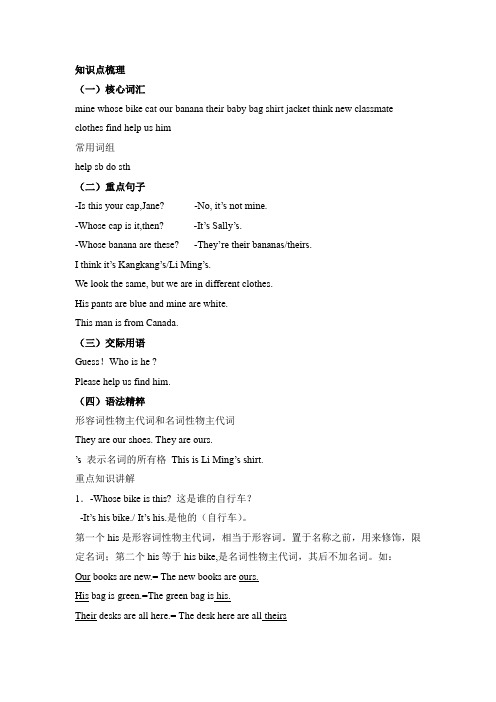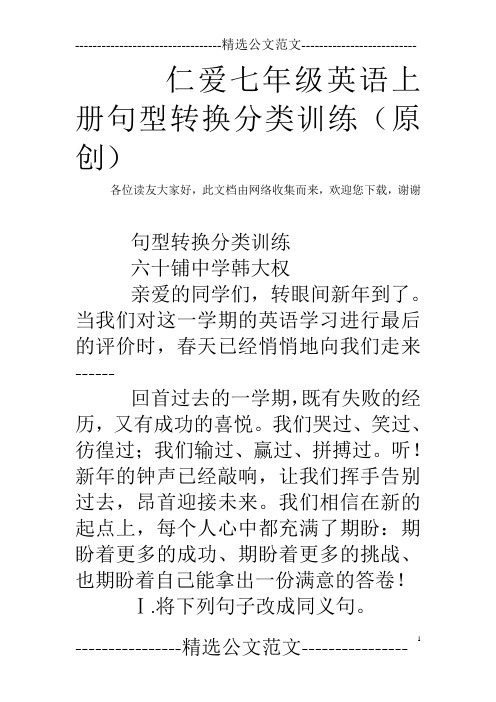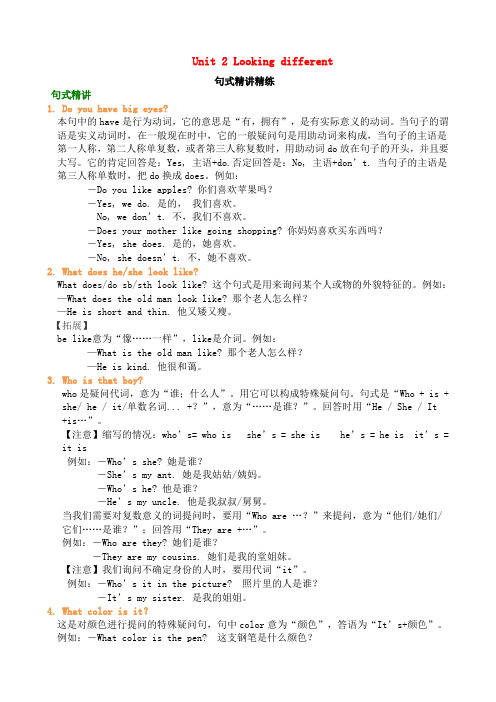仁爱英语七年级上册句型转换精讲细练
七年级仁爱版句型转换专项练习

七年级上册Unit1名词变复数专项练习名词变复数规则变化及发音:1、绝大多数的可数名词在词尾加上s ;book→books;desk→desks;pen→pens;car→carss遇t读浊辅音[ts],遇d读清辅音[dz]??friend→friends; cat→cats;2.、以s、x、ch、sh结尾的单词,在该词末尾加上-es;读音规则:读[iz];bus→buses; box→boxes; watch→watch ches; dish→dishes3、以辅音字母+y结尾的名词,要把y变为i,再加-es读音规则:读[z]。
fly→flies; b ab y→b abies;元音字母加y结尾的单词直接加s;eg:toy→toys;boy→boys;4、以-f或-fe结尾的名词,要将-f或-fe变为-v,再加es;读音规则:读[vz];knife→knives;leaf→leaves;5、以-o结尾的名词,初级阶段只有三个单词要加-es,其余都加-s;读音规则:读[z]。
tomato→tomatoes西红柿; potato→potatoes土豆; hero→heroes英雄; Negro—Negroes 口诀:“黑人英雄喜欢吃土豆和西红柿”名词变复数不规则变化:1.单词内部发生变化:口诀“oo常常变ee,男人女人a变e”foot→feet脚;tooth→teeth牙齿;man→men男人;woman→women女人;2.单复数相同:“羊鱼小鹿无变化,单数复数是一家”sheep→sheep绵羊;fish→fish鱼;deer→deer鹿;3.不规则变化:child→children孩子;mouse→mice老鼠;German→Germans德国人;4“某国人”的复数有三种类型:(1)Chinese, Japanese单数复数同形,不需加s;(2)Englishman, Frenchman, Dutchman复数要把man 变为men;(3)其他各国人以–an, -ian收尾的均直接加s。
仁爱英语七年级上册句型转换汇总

练习:将以下句子变为否认句1. I am a teacher. I a teacher.2. We are students. We students.3. Jane is a girl. Jane a girl.4. They like English. They like Chinese5. I come from China. I come from China.6. He likes Chinese. He like Chinese.7. Maria comes from Cuba.Maria come from Cuba.8. We know Maria. We know Maria. 练习: 将以下句子变为一般疑问句1. I am a teacher. a teacher?2. They are students. Students?3. Jane is a girl. a girl?4. They like English. they like English?5. I come from China. you come from China?6. He likes Chinese. he Chinese?7. Maria comes from Cuba.Maria from Cuba? 8.We speak Chinese.you Chinese?练习:给以下句子做一定回答或否认回答1.Are you a student Yes,. No,.2. Do they like English?Yes,. No,.3.Is Jane a girl Yes,. No,.4. Does Maria like China?Yes,. No,.5.Is Kangkang a student?Yes ,.No ,.6.Is that a girl?Yes ,.No ,.7.Are those telephones?Yes ,.No ,.8.Does Tom know Jane?Yes ,.No ,.9.Do they come from the U.S.A?Yes ,.No ,.10.Is this an egg? Yes , . No , . 1.Please give Jane the book.练习:划线部分发问Please the book Jane.1.My name is Nancy. your name?2. Could you please tell me your name?2.I am from China. are you from?Could you please your name me?3.I am fine . are you?3. He has short hair. is short.4. I have a big nose. is big.4. Miss.Wang is our English teacher.5. You have a wide mouth.is your English teacher?5.Lucy is ten years old. are you?is wide.6.My English teacher is old .6.He is in Class One Grade Two.is he in?My English teacher is not .7. Betty is not short. Betty is .7.My telephone number is 5805000.8.This is my book. This is .your telephone number?8.They are cars.9.This jacket is not new. This jacket is . are these ?9.This is my cap.10.My ruler is not long. My ruler is .cap is this?11.She looks lik her momShe and her mom10.My favorite movie star is Bruce Lee.is your favorite movie star ?look .11.It is yellow . is it12.They come from China.They China. ?12.She is tall. What does she ? 将以下句子变为复数.同义句变换. It is a box . boxes .This is a ruler. rulers. That is an eraser. erasers. He is a student. students. This is a bus. . That is a pen.将以下句子变为单数。
仁爱英语七年级上册Unit2,topic3知识点讲解及随堂练习

知识点梳理(一)核心词汇mine whose bike cat our banana their baby bag shirt jacket think new classmate clothes find help us him常用词组help sb do sth(二)重点句子-Is this your cap,Jane? -No, it’s not mine.-Whose cap is it,then? -It’s Sally’s.-Whose banana are these? -They’re their bananas/theirs.I think it’s Kangkang’s/Li Ming’s.We look the same, but we are in different clothes.His pants are blue and mine are white.This man is from Canada.(三)交际用语Guess!Who is he ?Please help us find him.(四)语法精粹形容词性物主代词和名词性物主代词They are our shoes. They are ours.’s 表示名词的所有格This is Li Ming’s shirt.重点知识讲解1.-Whose bike is this? 这是谁的自行车?-It’s his bike./ It’s his.是他的(自行车)。
第一个his是形容词性物主代词,相当于形容词。
置于名称之前,用来修饰,限定名词;第二个his等于his bike,是名词性物主代词,其后不加名词。
如:Our books are new.= The new books are ours.His bag is green.=The green bag is his.Their desks are all here.= The desk here are all theirs2.–Whose cat is that?那只猫是谁的?-It is her cat./It’s hers.是她的(猫)。
仁爱七年级英语上册句型转换分类训练(原创)

仁爱七年级英语上册句型转换分类训练(原创)各位读友大家好,此文档由网络收集而来,欢迎您下载,谢谢句型转换分类训练六十铺中学韩大权亲爱的同学们,转眼间新年到了。
当我们对这一学期的英语学习进行最后的评价时,春天已经悄悄地向我们走来------回首过去的一学期,既有失败的经历,又有成功的喜悦。
我们哭过、笑过、彷徨过;我们输过、赢过、拼搏过。
听!新年的钟声已经敲响,让我们挥手告别过去,昂首迎接未来。
我们相信在新的起点上,每个人心中都充满了期盼:期盼着更多的成功、期盼着更多的挑战、也期盼着自己能拿出一份满意的答卷!Ⅰ.将下列句子改成同义句。
1._________.2.Pleasedtomeetyou.______tomeetyou.3.Howareyoudoing?______areyou?4.Goodbye._________________.5.whereismichaelfrom?where_______michael______________?6.Tom________________7.youarewelcome._______ok._______allright.Not__________.8.Theyarenotinthesameclass.Theyarein______________.9.Shehasalargemouth,butIhaveasmallone. She________a________mouth,butIhaveas mallone.10.whichfilmstardoyoulikebest?________isyour________moviestar?11.Limingandjimaremyclassmates.______Limingandjim______myclassmates .12.wedonothavethesamelooks.we______________.13.Pleasegivemariatherubber.Please______therubber________maria.14.whosetrousersarethese?______________thesepants?15.ThegirlinareddressisTina.Thegirl______________isTina.16.Shehelpsmefindmyson.She______me_____findmyson.17.Ihaveapenfriendincanada.Ihavea___________incanada.?couldyouhelpme______English?_______________.He___________tovisittheGreatwall.,please.Please_______________________.?______isyour_________job?what_______yourmother________? Please______________yourschoolbag.?______you______totakesomecakestothepa rty??____________haveapicnic?__________________haveapicnic? ____________like______haveapicnic?______________havingapicnic?___________goodidea.?wouldyoulike_______________drink?She_______________English.?_____Ihelpyou?___________Ido____________?Theyareall______tome.Iam____________helpyou.I__________to_______somefood_____m ycat.you_____nice______it.we______________thepants.?______doyou____________thebooks? Thankyou______________________.’sgoshopping._________________________shopping.?_______he_________timethisSunday.?______he______to__________apicnic??couldyou______herto______me_______ _______thisevening?IamafraidI____________________time.?whois_________?’tathomenow.maria_____________now.?______the________.’soneofive.It’s______________________.’ssixforty-five.It’s___________________seven.?whatanimals______youlike______?’stimetoplaygames.It’stime____________.It’stimefor_______________?It’stimeforus________________? ’sthematterwithyou?_______________?________________withyou?’sniceofyoutohelpme.It’s__________ ofyoutohelpme.Thankyoufor_______me._________mouthis_________. HerEnglish_______________.?what_____shelike?______are______pens.Lucy____________hersister.It____________.?_____________isthedress?’sname?whatis___________oftheboy??___________________name?______ismy________food.62.Areherearsbig?_____she______bigears?63.Spellit,please.______________spellit,please?______________youspellit?64.whatcoloristheruler?what’sthecolor________theruler?65.Hedoesn’thaveanapple.He_____________________apple.66.It’stimeforlunch.It’stime_______________lunch.67.Nancyeatslunchatschool.Nancy_____________atschool.68.ourclassbeginsat8:.ourclassbeginsat8:00_________________ ___.Ⅱ.对划线部分提问。
七年级上仁爱句型转换专练

特+提be 情态动词 助动词
1. He says he wants to come to school. 2. Her favorite color is blue and white.
3. Mike lives in England.
4. She would like some eggs. 5. He wants to visit Wuhan. 6. The letter is from Maria.
变否定句
1. 直接在 be/ 情态动词 后+not She isn’t from Beijing. I can’t speak English. 2. 在动词前面+ don’t/ doesn’t She doesn’t like English at all.
改同义句
like…a lot = like…very much lots of =a lot of give sb sth=give sth to sb a photo of sb’s family= sb’s family photo poor= not good how do you like = what do you think of help sb with = help sb do would like = want have= eat trousers= pants try sth on = try on sth (代词放中间) free= have time have no time= don’t/ doesn’t have any time = is not free
仁爱版七年级英语上册Unit2Lookingdifferent句式精讲精练含答案

Unit 2 Looking different句式精讲精练句式精讲1. Do you have big eyes?本句中的have是行为动词,它的意思是“有,拥有”,是有实际意义的动词。
当句子的谓语是实义动词时,在一般现在时中,它的一般疑问句是用助动词来构成,当句子的主语是第一人称,第二人称单复数,或者第三人称复数时,用助动词do放在句子的开头,并且要大写。
它的肯定回答是:Yes, 主语+do.否定回答是:No, 主语+don’t. 当句子的主语是第三人称单数时,把do换成does。
例如:-Do you like apples? 你们喜欢苹果吗?-Yes, we do. 是的,我们喜欢。
No, we don’t. 不,我们不喜欢。
-Does your mother like going shopping? 你妈妈喜欢买东西吗?-Yes, she does. 是的,她喜欢。
-No, she doesn’t. 不,她不喜欢。
2. What does he/she look like?What does/do sb/sth look like? 这个句式是用来询问某个人或物的外貌特征的。
例如:—What does the old man look like? 那个老人怎么样?—He is short and thin. 他又矮又瘦。
【拓展】be like意为“像……一样”,like是介词。
例如:—What is the old man like? 那个老人怎么样?—He is kind. 他很和蔼。
3. Who is that boy?who是疑问代词,意为“谁;什么人”。
用它可以构成特殊疑问句。
句式是“Who + is + she/ he / it/单数名词... +?”,意为“……是谁?”。
回答时用“He / She / It +is…”。
【注意】缩写的情况:who’s= who is she’s = she is he’s = he is it’s = it is例如:-Who’s she? 她是谁?-She’s my ant. 她是我姑姑/姨妈。
仁爱英语七年级上册句型转换汇总 - 答案版
练习:将下列句子酿成否定句之樊仲川亿创作1. I am a teacher. I amnot a teacher.2. We are students. We aren’t students.3. Jane is a girl. Jane isn’t a girl.4. They like English. They don’t like Chinese5. I come from China. I don’t come from China.6. He likes Chinese. He doesn’t like Chinese.7. Maria comes from Cuba.Maria doesn’t come from Cuba.8. We know Maria. We don’t know Maria.练习:将下列句子酿成一般疑问句1. I am a teacher. Areyou a teacher?2. They are students. Arethey Students?3. Jane is a girl. IsJane a girl?4. They like English. Do they like English?5. I come from China. Do you come from China?6. He likes Chinese. Does he like Chinese?7. Maria comes from Cuba.Does Maria come from Cuba?8.We speak Chinese. Do you speak Chinese?练习:给下列句子做肯定回答或否定回答1.Are you a student?Yes, Iam . No, I’mnot .2. Do they like English?Yes, theydo . No, theydon’t .3.Is Jane a girl?Yes, sheis . No, sheisn’t .4. Does Maria like China?Yes, shedoes . No, shedoesn’t .5.Is Kangkang a student?Yes , heis . No , heisn’t .6.Is that a girl?Yes , itis . No , itisn’t .7.Are those telephones?Yes , theyare . No , theyaren’t .8.Does Tom know Jane?Yes , hedoes .No , hedoesn’t .9.Do they come from the U.S.A?Yes , theydo . No , theydon’t .10.Is this an egg?Yes , itis . No , itisn’t .练习:划线部分提问1.My name is Nancy. What’s your name?2.I am from China. Where are you from?3.I am fine . How are you?4. Miss.Wang is our English teacher.Who is your English teacher?5.Lucy is ten years old. Howold are you?6.He is in Class One Grade Two.Whatclass is he in?7.My telephone number is 5805000.Whatis your telephone number?8.They are cars. What are these ?9.This is my cap. Whose cap is this?10.My favorite movie star is Bruce Lee.Who is your favorite movie star ?11.It is yellow . Whatcolor is it?12.She is tall. What does she looklike?同义句转换.1.Please give Jane the book.Please give the book to Jane.2. Could you please tell me your name?Could you please your name me?3. He has short hair. Hishair is short.4. I have a big nose. Mynose is big.5. You have a wide mouth.Yourmouthis wide.6.My English teacher is old .My English teacher is not young .7. Betty is not short. Betty is tall .8.This is my book. This is mine .9.This jacket is not new. This jacket is old .10.My ruler is not long. My ruler is short .11.She looks like her mom.She and her mom look thesame .12.They come from China.They arefrom China.将下列句子酿成复数.It is a box . Theyare boxes .This is a ruler. Theseare rulers.That is an eraser. Thoseare erasers.He is a student. Theyare students. This is a bus. Thesearebuses .That is a pen. Thosearepens将下列句子酿成单数。
最新仁爱英语七上基础知识整理(词性转换,短语,句子等 )
七年级上复习要点Unit1 MakingNewFriends Topic1 Welcome toChina! 重要句型:1. A: Goodmorning/afternoon. 早上好/下午好B: Goodmorning/afternoon. 早上好/下午好2. A: Hello/Hi. 你好B: Hello/Hi. 你好3. A: Mom,this is my teacher ,Mr. Brown. Mr.Brown,this is mymom妈妈,这是我的老师,布朗先生。
布朗先生,这是我的妈妈B:How doyoudo? 你好(初次见面)A: How doyoudo? 你好4. A: Howareyou? 你好吗?(朋友,熟人间)B: I’m fine, thankyou. 我很好,谢谢5. A: Howareyou? 你好吗?(朋友,熟人间)B: Fine, thanks. Andyou? 我很好,谢谢。
你呢?A: I’mOK.我很好6. A: WelcometoChina. 欢迎到中国来。
B: Thankyou. /Thanks. 谢谢7. A: Nice tomeetyou. 很高兴见到你(初次见面)B: Nice to meetyou, too. 也很高兴见到你8. A: Nice toseeyou. 很高兴看见你(再次见面)B: Nice to seeyou, too. 也很高兴看见你9. A: Goodbye. 再见B: Bye. 再见.10. A:I’m Kangkang.AreyouMaria?.我是康康。
你是玛利亚吗?B:Y e s,I a m./N o,I’m no t.I’m J a n e.是的,我是。
/不,我不是。
我是简。
11. Hereyouare. 给你。
Topic 2 Where are you from?一.重要词组:1. my/your/his/hername 我的/你的/他的/她的名字2. my/your/his/hertelephonenumber 我的/你的/他的/她的电话号码3. befrom 来自4. familyname 姓5. givenname 名6. fullname 全名7. excuseme 打扰一下,劳驾二.重要句型:1. A: What’syourname,please? 请问,你叫什么名字?B: My nameisSally. 我名叫莎莉2. A: Where are you/theyfrom? 你(你们)/他们来自哪里?B:I’m/We’re/They’re fromCanada. 我/我们/他们来自加拿大3. A:Where ishe/shefrom? 他/她来自哪里?B:He’s /She’sfromAmerica.他/她来自美国4. A:Are you/theyfromJapan? 你(你们)他/她们来自日本吗?B: Yes,Iam/weare./theyare. 是的,我是/我们是。
仁爱英语七年级英语上册Unit1-Unit4句式精讲精练-精心整理(习题含答案)
仁爱英语七年级英语上册Unit1-Unit4句式精讲精练-精心整理(习题含答案)预览说明:预览图片所展示的格式为文档的源格式展示,下载源文件没有水印,内容可编辑和复制2018-2019学年度七年级仁爱英语上册Unit1-Unit4句式精讲精练-精心整理(习题含答案)Unit 1 Making New Friends句式精讲精练1. Good morning!“Good morning.”意为“早上好,上午好。
”,适用于比较正式客气的场合,用于早晨或上午(中午12点前)向他人问候。
答语仍为“Good morning!”在非常熟悉的人或家人问候时,可省略good,直接说morning即可。
问候时,称呼语通常放在后面,中间用逗号隔开。
例如:—Good morning, Alice! Alice,早上好!—Good morning, Cindy! Cindy,早上好!常见的日常问候语还有:“Good afternoon.”,下午好。
用于下午12点到18点这一时间段。
例如:- Good afternoon, Eric! Eric,下午好!- Good afternoon, Frank! Frank,下午好!“Good evening.”,晚上好。
用于晚上18点到21点这一时间段。
例如:- Good evening, Bob! Bob,晚上好!- Good evening, Alice! Alice,晚上好!2. Oh, nice to meet you, Jane.这是一个用于初次见面的有礼貌的问候语,它的回答用“Nice to meet you, too.”,表示“见到你也很高兴”的意思。
经常用在两个人初次见面或者经别人介绍后认识时,表示一种礼节。
这个句子经常用在下面三种情景中:—Hi, Jim! This is Li Lei. Jim! 这是李雷!—Hello, Li Lei! Nice to meet you! 李雷,你好!见到你很高兴!—Hello, Jim! Nice to meet you, too. Jim,你好!见到你我也很高兴!3. How are you?“How are you?”意为“你(身体)好吗?”是熟人之间就健康状况而发出的问候,但并不是想深入交谈某人的健康状况,只是一种礼貌的问候方式,其答语为“Fine./I’m fine. /I’m OK.Thanks./Thankyou.”等。
仁爱英语七年级上册句型转换汇总
练习:将下列句子变成否定句1 I am a teacher I a teacher2 We are tudent We tudent3 Jane i a gir Jane a gir4 The ie Engih The ie Chinee5 I come from China I come from China6 He ie Chinee He ie Chinee7 Maria come from CubaMaria come from Cuba8 We now Maria We now Maria 练习:将下列句子变成一般疑问句1 I am a teacher a teacher2 The are tudent Student3 Jane i a gir a gir4 The ie Engih the ie Engih5 I come from China ou come from China6 He ie Chinee he Chinee7 Maria come from CubaMaria from CubaChinae from the Ye , No , thi an eggYe , No ,练习:划线部分提问name i Nancy our nameam from China are ou fromam fine are ou4 i our Engih teacheri our Engih teacheri ten ear od are oui in Ca One Grade Twoi he inteee from ChinaThe China将下列句子变成复数It i a bo boeThi i a ruer ruerThat i an eraer eraerHe i a tudent tudentThi i a buThat i a JapanBeijingChinaTianan Men SquareChina e to Beijing ! ---________A Wecome to Beijing, tooB You’re wecomeC Than ouD Not at a3 ---__________ are ou in--- Ca FiveA What caB What gradeC What coorD What number4 He i _______ bue A to B from C under D in5 ----Who’ the gir over there-- Which one?---- _______ under the tree A Thi B That C Theone D One6 The bag i ___________A Bruce iB Bruce haC Bruce’D Bruce doe7 ________, what coor i the hirtA SorrB I’m orrC Ecue meD That’ right8 ---What coor i it ---_________A It’ an orangeB It’ orangeC It’ a orangeD An orange9 What coor ________ hi C under D in11 She oo ie a doctor, ______ he i a nureA andB orC tooD butI am afraid I don’t now --- _____A Than ouB ThanC Than ou anwaD Than ver much按要求完成句子1 Thi i a to(就划线部分提问)__________ i thi2 Hi name i Jac(就划线部分提问)__________ i hi name?3 M name i Kangang就划线部分提问)__________i _______ name?4 The are from Cuba就划线部分提问_________ ________ the from?5 I am Zhang Yimou (同义句)________ ________ i Zhang Yimou6 Thi i Mr Zhang就划线部分提问_________ thi?7 Nanjing i in Jianghu就划线部分提问____________ i Naning?8 Mar come from London就划线部分提问_______ ______ Mar ______from9 It’ from m en a, Luc就划线部分提问______ i it ______10 The are orange就划线部分提问___________ ________ the?11 M teeber i 就划线部分提问______ i our teeber?are in Grade Seven就划线部分提问________ ________ ______ the in’ thi in Engih(改为复数形式)_________ _________ in Engih?14 The are bue(改为单数形式)_________ _________ _________15 Kangang i from China同义句Kangang ______ _______ China16 I’d ie ome a en 就划线部分提问______ en i thi。
- 1、下载文档前请自行甄别文档内容的完整性,平台不提供额外的编辑、内容补充、找答案等附加服务。
- 2、"仅部分预览"的文档,不可在线预览部分如存在完整性等问题,可反馈申请退款(可完整预览的文档不适用该条件!)。
- 3、如文档侵犯您的权益,请联系客服反馈,我们会尽快为您处理(人工客服工作时间:9:00-18:30)。
文档收集于互联网,已重新整理排版.word 版本可编 辑.欢迎下载支持.仁爱英语七年级上册 句型转换精讲细练一、 肯定句改否定句的方法一步法1. 有 be 动词(is are am were was)/情态动词(can,could, will, would, shall, should,must,may)的。
在 be 动词/情态动词后后加 not。
2. 无 be 动词/情态动词,一般现在时在动词前加 don’t 第三人称单数前 doesn't/一般过去式 didn’t。
3 加 doesn't/ did n’t 的句子注意,句子动词要变成原型。
二、 肯定句改一般疑问句的方法 三步法1. 有 be 动词/情态动词:be 动词/情态动词提到句首,其余照抄,(some 改成 any,第一人称变为第二人称 my改成 your , I 改成 you,we 改成 you,our 改成 your )句末用问号。
2. 无 be 动词/情态动词,在句首加 Do/Does/Did,其余照抄,(some 改成 any,第一人称变为第二人称 my 改成 your , I 改成 you,we 改成 you,our 改成 your )句末用问号。
3. 加 Does、did 的句子注意,句子动词要变成原型。
例如 陈述句: They are in the park.He can play the guitar.He likes the dogs.否定句 They are not in the park. He can not play the guitar. He doesn't like the dogs一般疑问句: Are they in the park?Can he play the guitar?Does he like the dogs?把下列句子变成一般疑问句和 否定句1. I am listening to music._______________________________________2 Tom likes listening to music________________________________________3. Sarah can clean the classroom.________________________________________4. I put a book on my head.________________________________________5. There were some flowers in the vase. 6. We play basketball on Sundays. 7 I go to see my parents once a month.________________________________________ __________________________________________________________________8. She needs some masks._________________________________9. They like making the puppet.______________________10.SuHai and Su Yang lived in a new house. ________________________ ____________________三、变特殊疑问句 (对画线部分提问)1 文档来源为:从网络收集整理.word 版本可编辑.文档收集于互联网,已重新整理排版.word 版本可编 辑.欢迎下载支持.(一)、特殊疑问词的用法意思用法例句whowhomwhatwhichwhosewhat color What time whenwherewhyhowhow old how many how much how farhow soonhow long谁 谁 什么 哪一个谁的 什么颜色问人的身份,姓 名等 问人的身份,姓 名等(问宾语) 问人的职业或 事物是什么 问一定范围内 特指的人或物问所属关系问颜色(表语)He is LiLieWho is he ?He is my brother. Who is he ?I can ask him the question.Whom can you ask the question?He is a worker. What is he?He has a book. What does he have ?The big box is mine. Which box is yours?The girl at the door is Ann. Which girl isAnn?This is her book. Whose book is this ?This book is hers. Whose is this book?My skirt is red. What color is your skirt?几点 什么时候 什么地方 为什么 怎样多大几岁 多少 多少 多远 多久 多久问点时间问时间问地点(状语)问原因问健康状况、 做事的方式等问年龄 跟复数名词, 问数量 跟不可数名词 问数量或价钱 问路程问 in+一段时间问一段时间, 问物体的长短We play games at five in the afternoon ? What time do you play games? We play games in the afternoon ? When do you play games? We play games at home on Sunday ? Where do you play games on Sunday? He isn't at school today because he is ill. Why isn't he at school today ? He is fine/strong. How is he ? I go home by bike. How do you go home? He is ten. How old is he ? There are thirty boys in my class. How many boys are there in your class? There is some milk in the bottle. How much milk is there in the bottle? It's five kilometers away from here? How far is it from here? He can finish it in half an hour. How soon can he finish it ? He has lived here for a year. How long has he lived here? The desk is one meters long. How long is the desk ?1 文档来源为:从网络收集整理.word 版本可编辑.文档收集于互联网,已重新整理排版.word 版本可编辑.欢迎下载支持.how often 多久问频率I go to see my parents once a month.(一次)How often do you go to see your parents?(二)对画线部分提问,除了要注意选择正确的疑问词外,还要注意语序的运用。
1、 对句子的主语提问,其语序是: 疑问词+谓语+其他成分?(整个句子是陈述句语序)She is their teacher. Who is their teacher?主语 谓语主语 谓语2、对句子主语的定语部分提问,其语序是:疑问词+主语(即定语所修饰的名词)+ 谓语+其他成分?(整个句子是陈述句语序)My book is over there. Whose book is over there ?主语的定语 主语 谓语疑问词 主语 谓语以上两点方法都是:用正确的疑问词代替画线部分,再把句号改为问号,其余部分一般不做改变3.对表语或宾语的定语部分提问,其语序是:疑问词+表语或宾语(画线部分所修饰的名词)+一般疑问句(省略画线部分和它所修饰的名词)I'm looking for my watch.. 宾语的定语 宾语Whose watch are you looking for ? 疑问词 宾语 一般疑问句(省略掉 my watch)4、对表语、宾语或状语提问,其语序是: 疑问词+ 一般疑问句(省略掉画线部分)?He lives in Beijing . 状语5、对谓语和宾语提问,其语序是:Where does he live ? 疑问词 一般疑问句(省略掉画线部分 in Beijing )疑问词(What)+ 一般疑问句(其中谓语动词要用 do 的相对应形式代替, 省略掉宾语)He watches TV in the eveningWhat does he do in the evening?He watched TV yesterday evening.What did he do in the evening?He is watching TV now.What is he doing now?He was watching TV at that time?.What was he doing at that time?He is going to watch TV this evening.What is he going to do?He has seen the film.What has he done ?(三)疑问词的辨析How 的疑问句辨析一、how many 和 how much 的区别how many 用来询问可数名词的数量,它的句式是:How many+复数名词+一般疑问句+?how much 用来询问不可数名词的数量,也可询问价格。
二、how long,how often,how soon 的区别1、how longhow long 有以下两个主要意思:1. 表示多长时间,主要用来对一段时间(如 three days, four weeks 等)提问。
如:1 文档来源为:从网络收集整理.word 版本可编辑.文档收集于互联网,已重新整理排版.word 版本可编 辑.欢迎下载支持.A:How long did he stay here? 他在这儿呆了多久? B:About two weeks. 大约两个星期。
